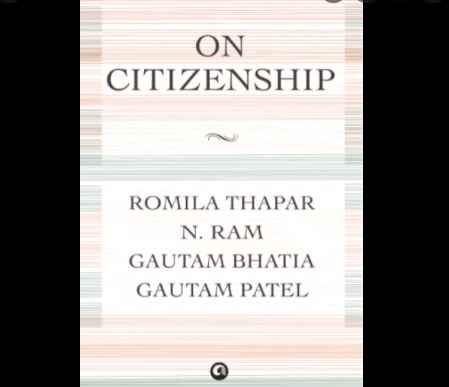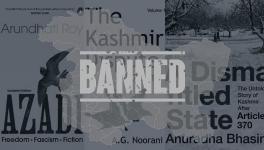Citizenship and Fundamental Rights

In On Citizenship, published by Aleph Book Company, four of India’s finest public intellectuals — Romila Thapar, N. Ram, Gautam Bhatia and Gautam Patel — go deep into key aspects of what constitutes citizenship in India, an issue that has lately been the subject of furious public debate, as a result of controversial decisions by the government in power.
This essay by the jurist Gautam Patel, titled “Past Imperfect, Present Tense”, looks at the organization of key provisions of the Constitution, and how they relate to citizenship, with an emphasis on the relationship between citizenship and fundamental rights. Below is an important excerpt from it.
There are many threats to liberty today. At least one is very old, Section 124A of the Indian Penal Code (IPC), the law on sedition. As advocate and author Abhinav Chandrachud has brilliantly shown, this is an archaic law enacted for wholly different reasons. It has no place in a contemporary democratic republic. In 2010, when England abolished its sedition law, the justice minister Claire Ward said:
Sedition and seditious and defamatory libel are arcane offences from a bygone era when freedom of expression wasn’t seen as the right it is today. Freedom of speech is now seen as the touchstone of democracy, and the ability of individuals to criticise the state is crucial to maintaining freedom. The existence of these obsolete offences in this country had been used by other countries as justification for the retention of similar laws which have been actively used to suppress political dissent and restrict press freedom.
Section 124A says:
Whoever, by words, either spoken or written, or by signs, or by visible representation, or otherwise, brings or attempts to bring into hatred or contempt, or excites or attempts to excite disaffection towards the Government established by law in India shall be punished with [imprisonment for life], to which fine may be added, or with imprisonment which may extend to three years, to which fine may be added, or with fine.
Explanation 1: The expression ‘disaffection’ includes disloyalty and all feelings of enmity.
Explanation 2: Comments expressing disapprobation of the measures of the Government with a view to obtain their alteration by lawful means, without exciting or attempting to excite hatred, contempt or disaffection, do not constitute an offence under this section.
Explanation 3: Comments expressing disapprobation of the administrative or other action of the Government without exciting or attempting to excite hatred, contempt or disaffection, do not constitute an offence under this section.
The crucial parts here, of course, are the phrase ‘the government by law established’ and the words hatred, contempt, and disaffection. Does the phrase refer to the party in administration, or does it refer to the nation and the state? Do the words include mere criticism as well? If it refers to a particular party or this or that government, and every form of criticism, then we have a very real problem, because most of us would then be in jail for a very long time. The most critical problem is that read literally the section runs into a head-on collision with Articles 19(1)(a) and 19(2) of the Constitution which deal with freedom of speech. Article 19(2) places limits on the right of free speech; but it does not use the word sedition. If the right to free speech cannot be curtailed on the ground that it is seditious, then making it an offence violates the right to free speech.
Also Read | Evolving politics of citizenship: N Ram
The conflict between the section and the constitutional guarantee of free speech was seemingly resolved by a five judge bench of the Supreme Court in 1962 in Kedar Nath Singh vs State of Bihar, which dealt with a challenge to the constitutionality of Section 124A. The Supreme Court traced the long and convoluted history of the law, and the constitutional provisions in relation to free speech: the trial of Bal Gangadhar Tilak in 1908, for instance, and the cases involving free speech. The Court saw that if mere criticism of administration constituted an offence, then the section was clearly unconstitutional. It analysed the three ‘explanations’ that appear below the section, and held that to resolve the conflict, the sedition law must be read to mean that mere criticism, however strongly worded, of administrative or other actions of the government do not constitute sedition unless it incites violence against the state; and that a ‘Government established by law’ is not the same as the administration, that is to say, the current dispensation. Therefore, to constitute an offence, the words must go beyond mere criticism of a particular party in power; they must attack the state and they must also incite or advocate violence. That, the court said, is the only way to balance both the section and the constitutional guarantee of free speech.
Kedar Nath quotes from Near vs Minnesota, a 1931 US case widely regarded as the first great free press case. In the context of free speech and sedition, Near vs Minnesota in turn quotes James Madison, the propounder of the First Amendment to the US Constitution, and its Bill of Rights advocating the constitutional guarantees of free speech.
In every State, probable in the Union, the press has exerted a freedom in canvassing the merits and measures of public men of every description which has not been confined to the strict limits of the common law. On this footing the freedom of the press has stood; on this footing it yet stands. …It has accordingly been decided by the practice of the States, that it is better to leave a few of its noxious branches to their luxuriant growth, than, by pruning them away, to injure the vigour of those yielding the proper fruits.
We so easily forget what we must most remember: our nation’s independence too was fought for and won by acts that all constituted sedition.
But Kedar Nath did not strike down the section at all, and many jurists and commentators have criticized the decision for this failure.
This is an excerpt from Gautam Patel's essay in On Citizenship (2021) published by Aleph Book Company. Republished here with permission from the publisher.
Justice Gautam Shirish Patel has served as the Honorary Secretary of the Bombay Bar Association for two three-year terms from 1999 to 2005 and served on the Association's Standing Committee till his appointment as a High Court judge.
Get the latest reports & analysis with people's perspective on Protests, movements & deep analytical videos, discussions of the current affairs in your Telegram app. Subscribe to NewsClick's Telegram channel & get Real-Time updates on stories, as they get published on our website.
























